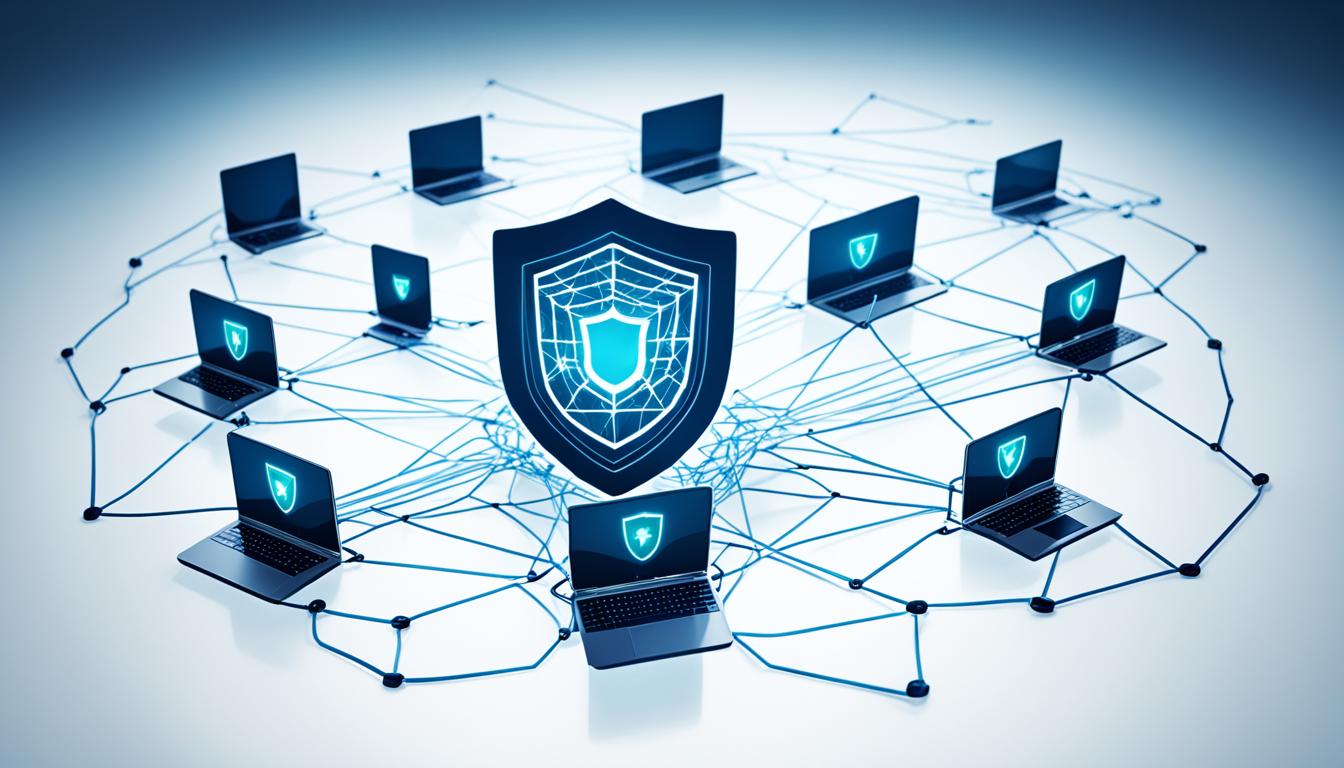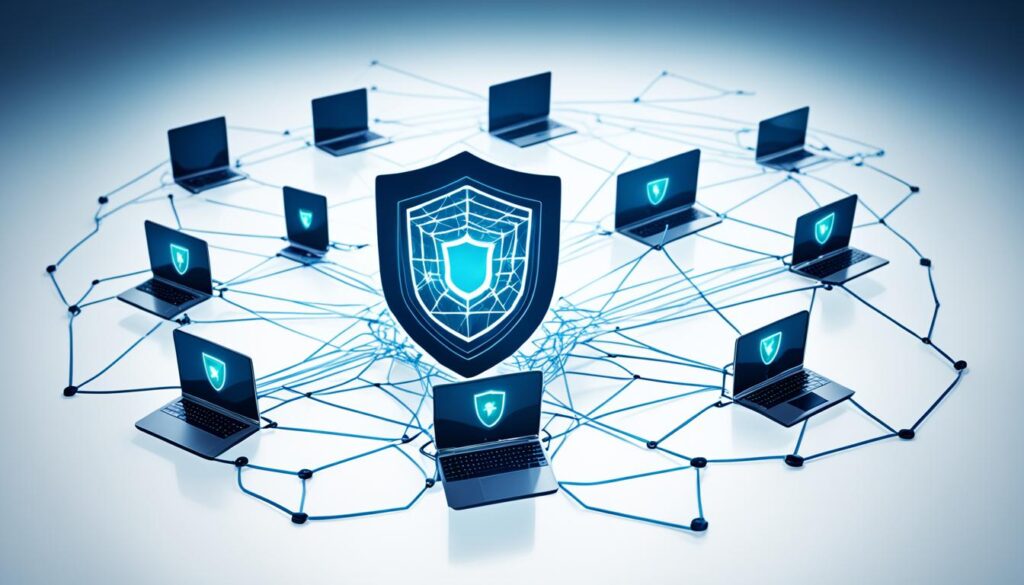Essential IT Security Policies for Optimal Cyber Protection

Essential IT Security Policies for Optimal Cyber Protection
In today’s world, cyber threats are always changing. So, organizations need strong IT security policies. These policies protect their data and systems. Ever wondered about the key IT security policies and how they help? Here, we’ll look at them. And we’ll see why they’re crucial for your organization’s safety and following rules (compliance).
Key Takeaways
- Understand the critical importance of IT security policies in protecting your organization from cyber threats.
- Explore the essential IT security policies, including network security, data protection, access control, incident response, and password management.
- Learn how to develop comprehensive IT security policies that align with industry best practices and regulatory requirements.
- Discover the key characteristics of effective IT security policies that help establish a strong cybersecurity framework.
- Recognize the role of security awareness training in cultivating a culture of security within your organization.
The Critical Importance of IT Security Policies
Ark Solvers values strong, essential IT security policies. These are key to protecting an organization’s data and other assets from cyber threats. They set rules and guidelines for managing digital assets securely.
Safeguarding Data and Systems from Cyber Threats
Firm IT security policies help businesses keep their important data safe and prevent data breaches and other cyber incidents. These policies include access control and incident response to handle threats well.
Compliance with Regulatory Requirements
Meeting compliance requirements is vital for cybersecurity policies. IT security policies ensure companies follow regulations. This avoids fines and keeps clients and partners happy.
Establishing a Culture of Security Awareness
Training on security awareness is essential in IT security policies. It teaches employees to care about security, making the company more secure against threats from its own team.

Network Security Policy
At Ark Solvers, we know how vital a sturdy network security policy is. It protects an organization’s digital treasures. This policy spells out the rules for keeping our clients’ network systems safe and ensures that only the right people get in.
Defining Access Controls and Firewalls
Ark Solvers’s network security policy focuses on tight access controls and robust firewalls. These are set up to prevent unwelcome visitors from accessing our network and key systems. We use strong user checks, give different access levels based on roles, and use modern firewall tech to watch and sift through network data.
Monitoring and Incident Response Procedures
At Ark Solvers, our network security policy also includes monitoring the network closely and having a plan in case something goes wrong. Our security team is always on the lookout for anything strange on the network. This way, we can quickly deal with and lessen the effect of any cyber threats, which means our clients’ networks stay safe and available.
Data Protection Policy
At Ark Solvers, keeping our data safe is a top priority. Our policy outlines how we manage and secure important information. We follow industry best practices and legal rules closely.
Data Classification and Handling Guidelines
We start by sorting data into levels based on how sensitive it is. This helps us treat each kind of data correctly. From public to super secret info, our team knows how to handle it all.
Encryption and Key Management Practices
To keep data safe from bad actors, Ark Solvers uses strong encryption. Our rules decide on the right encryption methods and how to manage keys properly. Encrypted data is safer, but we also focus on the security of the keys themselves.
Access Control Policy
At Ark Solvers, we know how crucial it is to control who can access an organization’s systems and resources. Our policy sets strict rules for user authentication, authorization, and managing privileged accounts.
User Authentication and Authorization Measures
We require multi-factor authentication to check users’ identities before they can enter our network or use specific apps or data. Role-based access controls are also in place. They make sure users only get the permissions they need for their work, following the least privilege principle.
Privileged Account Management
We understand the extra risks with privileged accounts. Our policy details how we handle and watch over these special accounts. We use careful approval steps, frequent account checks, and set-up systems to monitor and stop any unauthorized actions.
Incident Response Policy
At Ark Solvers, a detailed incident response policy is key. It helps us spot, act on, and recover from cyber threats quickly. This approach is crucial for safeguarding our data and operations against cyber risks.
Incident Identification and Reporting Procedures
Our incident response policy makes it easy to spot security problems and report them. Staff learn to see the signs of things like hacking attempts, data leaks, or strange computer actions. Once an issue is noticed, it must be reported right away using our set procedures. This lets our response team start the right steps to investigate and fix the issue.
Incident Containment and Recovery Strategies
If a security issue occurs, our policy guides us on how to prevent further harm and restore normalcy. It spells out who does what, like stopping bad network activity and collecting clues. We also know how to restore systems, spread the word to everyone involved, and review what happened and how we responded.
Password Policy
At Ark Solvers, we know how important password policies are. They keep our client’s systems and data safe. Our policy sets rules for making, using, and changing passwords.
Password Complexity and Expiration Requirements
We believe in strong, safe passwords. Our policy requires passwords to be at least 12 characters long, contain capital and small letters, numbers, and symbols, and be changed every 90 days. This keeps accounts safe from hacking.
Password Management and Reset Processes
Managing and resetting passwords is secure at Ark Solvers. Passwords are reset using a special portal, with extra steps to confirm who’s asking. Only the right people can access our secure area for storing passwords, which ensures that our user accounts are always protected.
Essential IT Security Policies
At Ark Solvers, we know that creating strong IT security policies is key to protecting against cyber threats. These policies help keep digital assets safe and meet industry rules, which is vital for ensuring security and promoting awareness.
Developing Comprehensive Security Policies
Good IT security policies must cover network safety, data protection, and who can access what. They also include plans for when problems occur and manage passwords. With these policies in place, organizations can act before cyber threats harm their systems.
Aligning Policies with Industry Best Practices
Organizations need to follow the most up-to-date IT security standards and laws. This ensures that their IT security policies are effective. Plus, it shows they take cybersecurity and data safety seriously for everyone concerned.
Creating and following top IT security policies based on industry best practices lets organizations build a strong cybersecurity framework. With a good plan, they can protect their information and systems against new threats. This strategy not only makes them more secure but also shows they’re serious about keeping their digital assets safe and following the law.
Conclusion
Ark Solvers highlights the importance of strong IT security policies for every organization. These policies are crucial to protecting against cyber threats. By focusing on network security, data protection, access control, incident response, and password management, companies can build a solid cybersecurity framework that meets both best practices and regulatory requirements.
This article outlines key IT security policies to boost data protection, control access, and improve incident response. These measures help fight cyber attacks and stay in line with standards. By instilling a culture of security awareness, employees can actively support the cybersecurity strategy.
The tech world is always changing. Ark Solvers advises staying alert, updating IT security policies, and responding to new cyber threats. Focusing on risk management and maintaining a strong cybersecurity posture helps protect assets and preserve a company’s reputation and future against cyber challenges.
FAQ
What are the essential IT security policies that organizations should have in place?
Every organization should have key IT security policies. These include Network Security, Data Protection, Access Control, Incident Response, and Password policies. They lay out rules and guidelines to keep data, systems, and infrastructure safe from cyber threats.
Why are IT security policies critical for businesses?
IT security policies are crucial for businesses. They protect data and systems from online dangers, ensure companies follow legal rules, and create a secure mindset among their staff. This way, businesses can keep their digital information safe and running smoothly despite cyber risks.
What should a network security policy include?
A network security policy must cover important areas. It defines how to block unauthorized access through access controls and firewalls, sets out guidelines for always monitoring network activities, and plans what to do if security incidents happen. By focusing on these areas, the policy keeps an organization’s network safe and avoids data leaks.
What are the key components of a data protection policy?
Data protection policies have several main parts. They explain how data should be handled based on its sensitivity and detail encryption and key management rules. This policy ensures that an organization’s most important data stays safe, private, and available.
What does an access control policy typically cover?
Access control policies usually talk about who can use what in a company’s systems. They include ways to check a user is who they say they are. And they limit what each person can do based on their job. These measures keep unauthorized people out, preventing security problems.
What are the key elements of an incident response policy?
An incident response policy has several important aspects. It outlines how to spot and share news about security problems. It plans how to limit their effect and get back to work as usual. There are also roles and ways to talk to others during an issue. This policy guides an organization in managing and rebounding from cyber-attacks, helping to limit damage and downtime.
What should a password policy cover?
A good password policy explains the rules for making and changing passwords, tells how to safely handle and reset them, and teaches users how to create strong, secure passwords. This policy guards against using weak or stolen passwords, which could cause security issues.
What are some best practices for developing effective IT security policies?
Developing strong IT security policies involves several steps. Policymakers should consider what the industry recommends and what the law requires. They should also get input from important teams like IT, security, and compliance. Regular policy updates are key to staying safe from new threats. Offering security training also helps employees follow the rules. These steps help organizations build security policies that really work.







